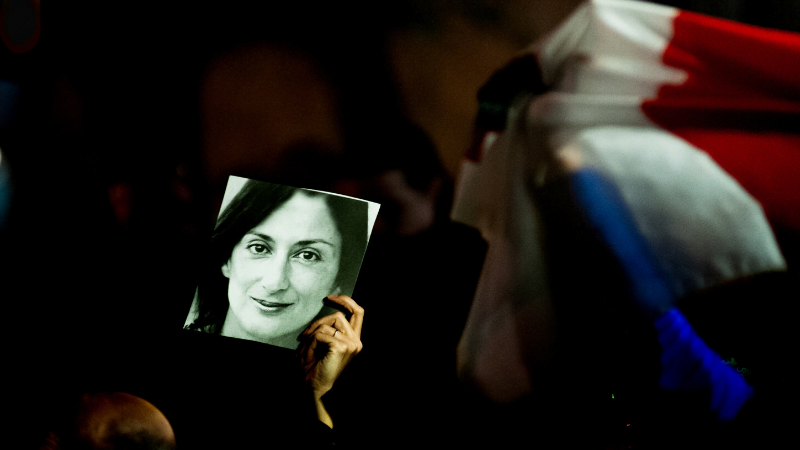The Council of Europe’s platform for media freedom and safety of journalists has listed Malta as a “country of exceptional concern” when it comes to press freedom in its 2020 annual report.
Titled Hands off Press Freedom: Attacks on media in Europe must not become a new normal, the report highlighted a number of factors that led to concerns about press freedom in Malta, starting from the murder of journalists Daphne Caruana Galizia in October 2017.
The “concern” also came about due to three media freedom alerts submitted to the platform in 2019 together with an observation from the Committee on Legal Affairs and Human Rights of the Parliamentary Assembly of the Council of Europe, which noted “a series of fundamental weaknesses in Malta’s system of checks and balances… seriously undermining the rule of law”.
The media alerts were all filed last year – the cyber attack against The Shift in January, an intimidating letter by law firm Carter Ruck against the authors of Murder on The Malta Express: Who Killed Daphne Caruana Galizia? in October and when journalists were locked inside the Office of the Prime Minister after a press conference in December 2019,
Malta is also listed in the list of countries and regions in focus, alongside Albania, Hungary, Poland, Russia, Turkey and France.
.@CoE’s 2019 Annual Report: “Attacks on media in Europe must not become the new normal.” @ECPMF new member of Platform on Safety of Journalists monitors rise in attacks. #EuropeForFreeMedia #MediaFreedomRR
More: https://t.co/ppZtjUnGjX pic.twitter.com/kRW9CDeaoQ— European Centre for Press and Media Freedom (@ECPMF) April 29, 2020
The report noted that in October 2019, two years after the assassination of Caruana Galizia, the alert on her murder was transferred to the category of cases of impunity after the partner organisations determined that there had been “a clear failure after that time to make the necessary progress in the investigation”.
This particular category highlights “deficiencies in investigations, including the failure to identify the perpetrators, sponsors, organisers or masterminds of these crimes, and the failure to secure evidence”.
In fact, impunity for the killing of journalists and other serious attacks is listed as one of the topics in focus within the report, under which there are 22 alerts relating to unsolved murders of journalists out of 31 listed alerts of impunity at the end of 2019. “Impunity often reveals wider, systemic flaws in the rule of law,” the report noted.
In December 2019, there was an update to a 2017 alert concerning the outstanding libel suits brought against Caruana Galizia before her death after former chief-of-staff Keith Schembri withdrew the two libel suits he had filed against her over her articles about his Panama company.
Platform partners and media freedom organisations have repeatedly called for a repeal of laws allowing the posthumous pursuit of defamation cases. “It is unacceptable that over 30 posthumous civil defamation proceedings against Daphne Caruana Galizia’s family are still underway,” the report said.
The 2020 Annual Report analyses alerts submitted to @CoEMediaFreedom in 2019 & shows a growing pattern of intimidation to silence journalists. It is a loud
wake-up call to CoE member states to act quickly to end the assault against press freedomhttps://t.co/mKdMkM8oRi— EFJ (@EFJEUROPE) April 29, 2020
It also acknowledged the “important developments” that took place towards the end of 2019 in the ongoing investigation into the assassination of Caruana Galizia, as well as the launch of the public inquiry into the assassination.
Other topics affecting press freedom on a European scale which are highlighted by the report include censorship in the form of ‘fake news’, counterterrorism, government accountability, issues with policing linked to media coverage of protests and demonstrations, online harassment, and public service media being undermined and exploited for political advantage.
“In 2019, Europe was an intense and often dangerous battleground for press freedom and freedom of expression”, the organisations said. In total, the Council of Europe’s Platform to promote the protection of journalism and the safety of journalists recorded 142 serious threats to media freedom, including 33 physical attacks against journalists, 17 new cases of detention and imprisonment, 43 cases of harassment and intimidation, and two new cases of impunity for murder, one of which was Caruana Galizia’s.
The report was compiled by the partner organisations to the Council of Europe Platform to Promote the Protection of Journalism and Safety of Journalists. The organisations include Index on Censorship, Article19, European Federation of Journalists (EFJ), Reporters Without Borders and Pen International.













